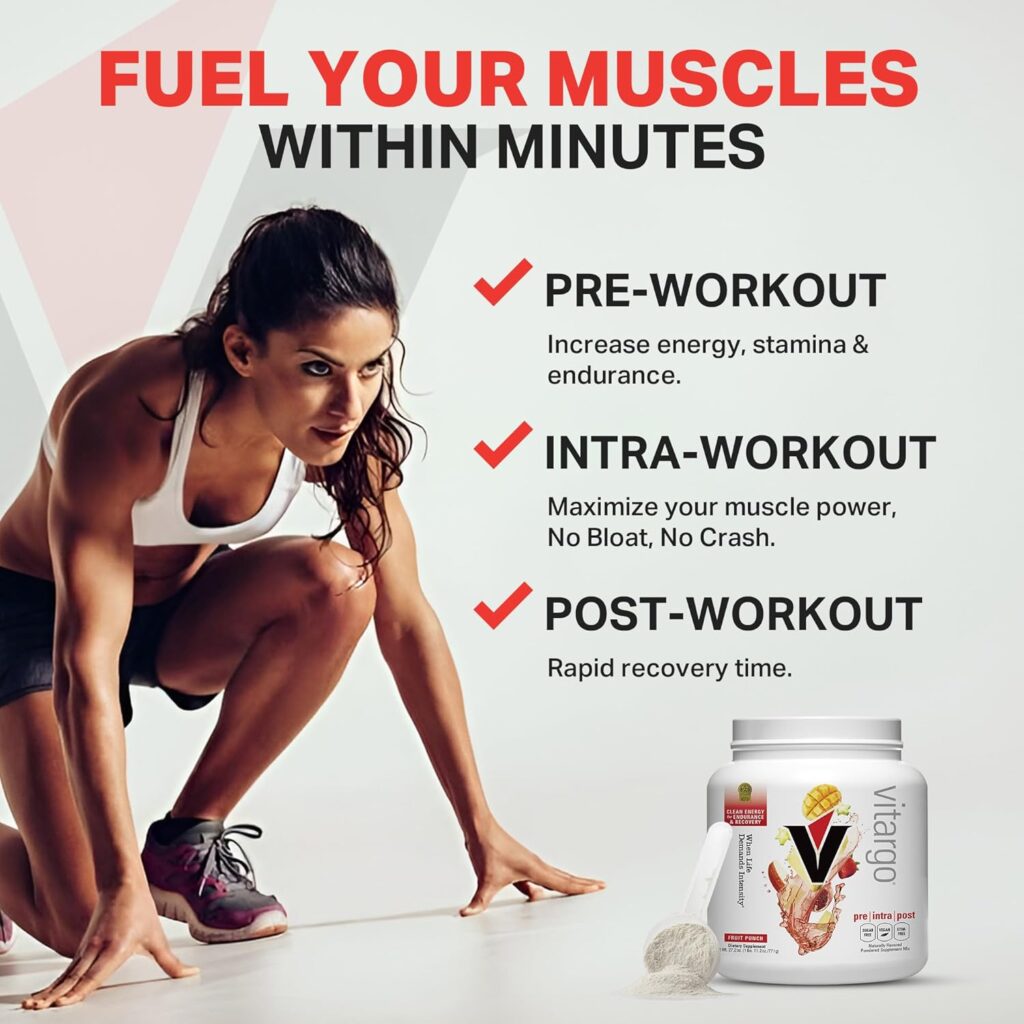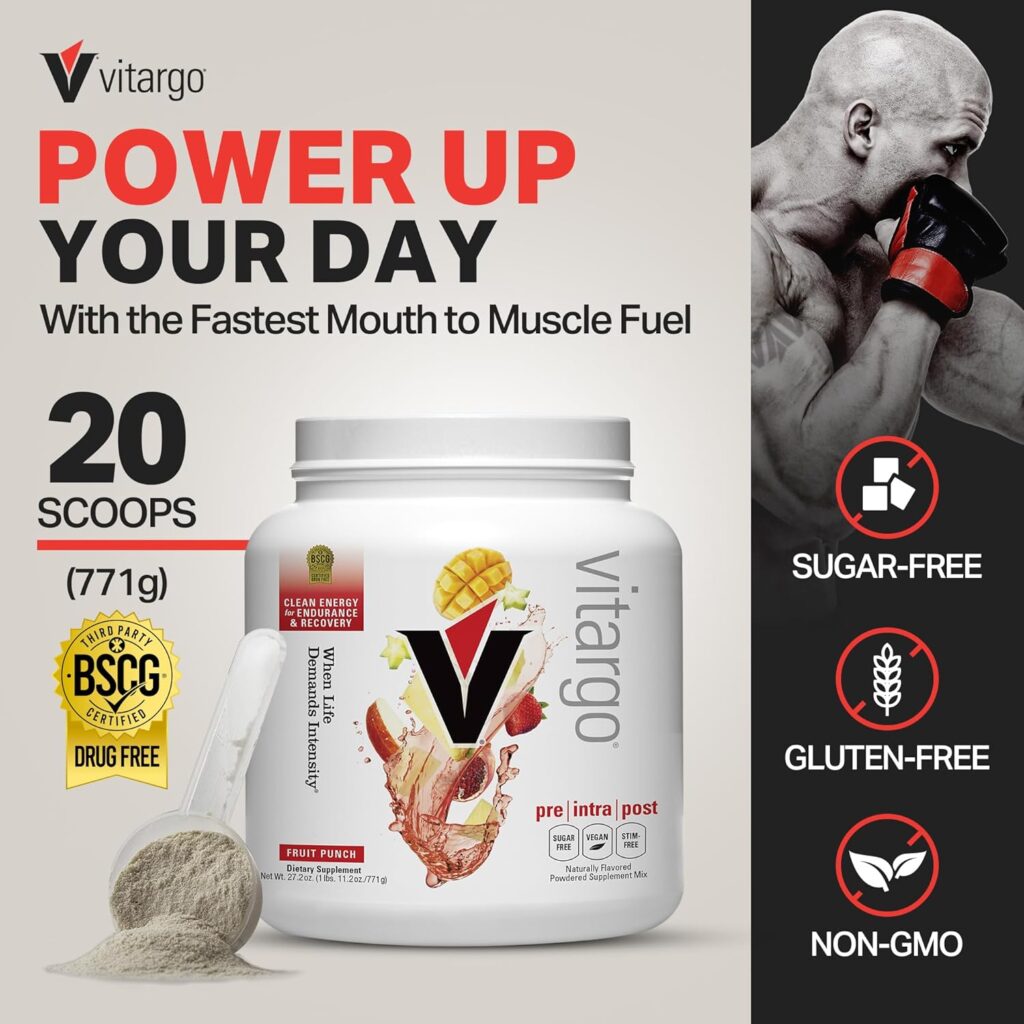Introduction: The Crucial Role of Post-Workout Carbs
After an intense workout, your body needs proper nourishment to recover effectively. You’ve pushed your limits, depleted your glycogen stores, and broken down muscle fibers.
Now it’s time to refuel and repair.
Carbohydrates play a vital role in this process, acting as the cornerstone of your body’s recovery potential.
In this comprehensive guide, we’ll explore the top 10 carbohydrates that can supercharge your post-workout recovery. We’ll look at the science behind their effectiveness and provide practical tips on incorporating them into your nutrition plan for optimal results.
*As an Amazon Associate, I may earn a commission from qualifying purchases at no additional cost to you. I only recommend products or services I believe will add value to my readers. *
The Science Behind Post-Workout Carbohydrates

Understanding why carbohydrates are essential for recovery is crucial. During exercise, your body primarily uses glycogen (stored carbohydrates) as fuel.
Intense workouts can significantly reduce these stores, leaving your muscles in need of replenishment.
Consuming carbohydrates after exercise serves several critical purposes:
- Glycogen Replenishment: Carbs help restore the glycogen you’ve burned during your workout, preparing your body for future exercise sessions.
- Insulin Response: Carbs trigger an insulin response, which aids in shuttling nutrients, including amino acids, into your muscles.
- Protein Synthesis: When combined with protein, carbs can enhance muscle protein synthesis, supporting repair and growth.
- Cortisol Reduction: Post-workout carbs can help lower cortisol levels, potentially reducing muscle breakdown.
Now, let’s explore the top 10 carbohydrates that can improve your post-workout recovery.
1. Sweet Potatoes
Sweet potatoes are an excellent source of complex carbohydrates, providing a steady release of energy to replenish your glycogen stores. Their nutritional profile extends beyond just carbs, offering a range of vitamins and minerals that support overall recovery.
The high potassium content in sweet potatoes helps restore electrolyte balance, which is crucial after a sweaty workout. They’re also rich in vitamin C, an antioxidant that can help reduce exercise-induced oxidative stress and inflammation.
Sweet potatoes contain beta-carotene, which your body converts to vitamin A. This nutrient plays a role in immune function and may help reduce exercise-induced inflammation.
For a quick and easy post-workout meal, try mashing a baked sweet potato and mixing it with a scoop of protein powder. This combination provides a perfect blend of carbs and protein to kickstart your recovery process.
2. Bananas
Bananas are often referred to as nature’s energy bars, and for good reason. They’re rich in easily digestible carbohydrates, making them perfect for rapid glycogen replenishment.
The natural sugars in bananas – glucose, fructose, and sucrose – provide a quick energy boost while also offering sustained fuel.
What sets bananas apart is their impressive potassium content. This essential mineral plays a crucial role in muscle function and can help prevent post-workout cramping.
Bananas also contain vitamin B6, which aids in energy metabolism and the production of red blood cells.
The riper the banana, the more easily digestible it’s carbohydrates become. If you’re looking for quick absorption, opt for a fully ripe banana with brown spots.
For a more sustained release of energy, choose a slightly less ripe banana with a greenish-yellow peel.
Bananas are incredibly versatile and can be easily incorporated into your post-workout routine. Eat them on their own, slice them onto whole-grain toast, or blend them into a protein shake for a delicious and effective recovery meal.
3. Quinoa
Quinoa stands out as a unique grain that offers a finish protein profile alongside it’s complex carbohydrates. This dual-nutrient composition makes it an excellent choice for those looking to mix their post-workout carbs and protein in one source.
The complex carbohydrates in quinoa provide a steady release of energy, helping to maintain stable blood sugar levels during the recovery period. This sustained energy release can be particularly useful for endurance athletes or those engaging in long training sessions.
Quinoa is also rich in magnesium, a mineral that plays a crucial role in muscle function and protein synthesis. Adequate magnesium intake can help reduce muscle soreness and improve recovery time.
The anti-inflammatory properties of quinoa can help reduce exercise-induced inflammation, potentially speeding up recovery time. This makes it an excellent choice for athletes engaged in high-intensity or impact sports.
To incorporate quinoa into your post-workout meal, try preparing a quinoa bowl with mixed vegetables and a lean protein source like grilled chicken or tofu. This balanced meal provides a range of nutrients to support your recovery process.
4. Oats
Oats have long been a staple in athletes’ diets, and for good reason. They’re packed with complex carbohydrates that provide sustained energy release, perfect for replenishing glycogen stores over time.
One of the unique features of oats is their high content of beta-glucan, a type of soluble fiber. Beta-glucan has been shown to support immune function, which can be particularly useful during periods of intense training when the immune system may be compromised.
Oats also contain a good amount of protein compared to other grains, making them a more finish post-workout food. The combination of complex carbs and protein can help support muscle recovery and growth.
The versatility of oats makes them an excellent choice for various post-workout meals. You can enjoy them hot, cold, or even blend them into a smoothie for quick consumption.
For an extra recovery boost, try preparing overnight oats.
Mix oats with milk, protein powder, and your favorite fruits the night before. By morning, you’ll have a delicious, nutrient-packed post-workout meal ready to go.
5. Berries
Berries – such as blueberries, strawberries, and raspberries – offer a unique combination of simple carbohydrates and powerful antioxidants. The simple sugars provide quick energy, while the antioxidants help combat exercise-induced oxidative stress.
Berries are particularly rich in anthocyanins, compounds that have been shown to reduce inflammation and support muscle recovery. These antioxidants can help neutralize free radicals produced during intense exercise, potentially reducing muscle damage and soreness.
Despite their sweet taste, berries are relatively low on the glycemic index, meaning they won’t cause rapid spikes in blood sugar. This makes them an excellent choice for maintaining stable energy levels during the recovery period.
Berries are also a good source of vitamin C, which plays a role in collagen synthesis. Collagen is crucial for maintaining healthy joints and connective tissues, which can be particularly useful for athletes engaged in high-impact sports.
Frozen berries are just as nutritious as fresh ones and can be more convenient for post-workout smoothies. Keep a bag in your freezer for easy access.
Try blending frozen berries with Greek yogurt and a scoop of protein powder for a delicious and nutritious post-workout shake.
6. Brown Rice
Brown rice is a staple carbohydrate source for many athletes because of it’s rich complex carbohydrate content. These complex carbs provide sustained energy release, perfect for replenishing glycogen stores over several hours post-workout.
What sets brown rice apart from it’s white counterpart is it’s higher fiber and nutrient content. The fiber aids in digestion and helps maintain stable blood sugar levels, while the extra nutrients support overall recovery and health.
Brown rice is a good source of selenium, a mineral that acts as an antioxidant in the body, potentially helping to reduce exercise-induced oxidative stress. It also contains manganese, which is involved in protein metabolism and energy production.
The B vitamins found in brown rice, particularly B1 (thiamin) and B3 (niacin), play crucial roles in energy metabolism. These vitamins help your body convert the carbohydrates from the rice into usable energy for your recovering muscles.
For a balanced post-workout meal, pair brown rice with a lean protein source like grilled chicken or fish, and add some colorful vegetables for additional nutrients. This combination provides a good balance of carbohydrates, protein, and micronutrients to support your recovery process.
7. Chocolate Milk
Chocolate milk might seem like an unlikely recovery food, but it’s gained popularity among athletes for good reason. It offers a near-perfect ratio of carbohydrates to protein, making it an excellent choice for post-workout recovery.
The simple sugars in chocolate milk provide rapid energy replenishment, while the protein supports muscle repair and growth. The combination of fast-acting carbs and high-quality protein can help kickstart the recovery process immediately after your workout.
Chocolate milk is also an excellent source of electrolytes, particularly sodium and potassium, which are lost through sweat during exercise. Replenishing these electrolytes is crucial for proper muscle function and preventing cramping.
The calcium content in chocolate milk supports bone health, which is particularly important for athletes engaged in high-impact sports. Additionally, the vitamin D often added to milk aids in calcium absorption and may have anti-inflammatory properties.
If you’re lactose intolerant or vegan, you can create a similar nutrient profile with chocolate-flavored plant-based milk and a scoop of protein powder. This choice can provide similar benefits while catering to different dietary needs.
8. Whole Grain Bread
Whole grain bread is a convenient and effective post-workout carbohydrate source. It provides a mix of simple and complex carbohydrates, offering both immediate and sustained energy release.
The fiber content in whole grain bread helps stabilize blood sugar levels and supports digestive health. This can be particularly useful for maintaining steady energy levels during the recovery period and preventing energy crashes.
Whole grains are rich in B vitamins, which play crucial roles in energy metabolism. These vitamins help your body convert the carbohydrates from the bread into usable energy for your recovering muscles.
Whole grain bread also contains minerals like iron, magnesium, and zinc, which support various aspects of recovery and overall health. Iron is particularly important for athletes as it plays a crucial role in oxygen transport throughout the body.
For a balanced post-workout meal, pair your whole grain bread with a protein source like turkey or eggs. Add some avocado for healthy fats and you’ll have a well-rounded meal that supports both glycogen replenishment and muscle repair.
9. Dates
Dates are often referred to as nature’s candy, packed with easily digestible simple carbohydrates that can provide a quick energy boost post-workout. Their natural sugars are primarily glucose and fructose, which are rapidly absorbed by the body.
Dates are an excellent source of potassium, making them ideal for replenishing electrolytes lost through sweat. Potassium plays a crucial role in muscle function and can help prevent post-workout cramping.
What sets dates apart is their content of unique antioxidants called flavonoids, which can help reduce inflammation and support overall health. These antioxidants may help combat exercise-induced oxidative stress and support faster recovery.
Dates also contain small amounts of magnesium and calcium, both of which are important for muscle function and recovery. The natural fiber in dates can help stabilize blood sugar levels, providing a more sustained energy release.
For a quick and easy post-workout snack, try stuffing dates with almond butter. This combination provides a good balance of quick-acting carbs and healthy fats.
You can also chop dates and add them to your post-workout smoothie or oatmeal for a natural sweetener with added recovery benefits.
10. Pineapple
Pineapple rounds out our list with it’s unique combination of simple carbohydrates and digestive enzymes. The simple sugars in pineapple provide quick energy, while it’s high water content aids in rehydration.
What makes pineapple stand out is it’s content of bromelain, an enzyme that has anti-inflammatory properties and may help reduce muscle soreness. Some studies suggest that bromelain can help reduce exercise-induced inflammation and speed up recovery time.
Pineapple is also rich in vitamin C, supporting immune function and collagen synthesis for tissue repair. Vitamin C is a powerful antioxidant that can help combat exercise-induced oxidative stress and support overall recovery.
The manganese content in pineapple supports energy production and antioxidant defenses. This mineral is also involved in the metabolism of carbohydrates and proteins, making it particularly relevant for post-workout nutrition.
Fresh pineapple contains the highest levels of bromelain. If using canned pineapple, opt for varieties packed in juice as opposed to syrup to avoid excess added sugars. Try adding pineapple to your post-workout smoothie or enjoy it as a refreshing snack alongside a protein source for a balanced recovery meal.
Conclusion: Optimizing Your Recovery with Carbohydrates
Choosing the right carbohydrates for post-workout recovery can significantly impact your results and overall athletic performance. By incorporating these top 10 carbohydrates into your post-workout nutrition plan, you’re providing your body with the fuel it needs to replenish, repair, and grow stronger.
Remember, the key to effective post-workout nutrition is consistency and timing. Aim to consume a combination of carbohydrates and protein within 30 minutes to an hour after your workout for optimal recovery.
Experiment with different combinations of these carbohydrates to find what works best for your body and your training regimen. Your post-workout meal should be both nutritious and enjoyable – after all, you’ve earned it!
By fueling your recovery with these powerhouse carbohydrates, you’re setting yourself up for success in your next workout and beyond. Give your body the nourishment it deserves, and watch your performance soar to new heights.
Frequently Asked Questions
What are the best carbs to eat after a workout?
The best carbs to eat after a workout include complex carbohydrates like sweet potatoes, quinoa, and oats, as well as simple carbohydrates like bananas and dates. These provide a mix of quick energy and sustained release to support recovery.
How soon after a workout should I eat carbs?
It’s generally recommended to consume carbohydrates within 30 minutes to an hour after your workout. This timing helps maximize glycogen replenishment and supports the recovery process.
Are simple or complex carbs better for post-workout recovery?
Both simple and complex carbs have their place in post-workout recovery. Simple carbs provide quick energy, while complex carbs offer sustained release.
A combination of both can be useful for optimal recovery.
Can I eat fruit after a workout?
Yes, fruits like bananas, berries, and pineapple are excellent post-workout choices. They provide simple carbohydrates for quick energy replenishment and often contain additional nutrients that support recovery.
Is brown rice good for muscle recovery?
Brown rice is an excellent choice for muscle recovery. It provides complex carbohydrates for sustained energy release and contains nutrients like selenium and B vitamins that support overall recovery.
How much carbohydrate should I consume after a workout?
The amount of carbohydrate needed post-workout varies depending on factors like body weight, workout intensity, and duration. A general guideline is to consume 0.5-0.7 grams of carbohydrate per pound of body weight within 30 minutes of finishing your workout.
Are sweet potatoes better than white potatoes for post-workout recovery?
While both sweet potatoes and white potatoes can be useful, sweet potatoes often edge out white potatoes because of their higher nutrient density, including higher levels of vitamins A and C, which can support recovery.
Can chocolate milk really help with workout recovery?
Yes, chocolate milk has gained popularity as a recovery drink because of it’s optimal carbohydrate-to-protein ratio, which can support muscle recovery and glycogen replenishment.
Are oats a good post-workout food?
Oats are an excellent post-workout food. They provide complex carbohydrates for sustained energy release, contain protein, and offer additional benefits like beta-glucan for immune support.
How do berries help with post-workout recovery?
Berries help with post-workout recovery by providing simple carbohydrates for quick energy replenishment. They’re also rich in antioxidants, which can help reduce exercise-induced inflammation and oxidative stress.
Key Takeaways
- Post-workout carbohydrates are crucial for glycogen replenishment, supporting muscle recovery, and reducing exercise-induced stress.
- A mix of simple and complex carbohydrates can provide both immediate and sustained energy for optimal recovery.
- Nutrient-dense carbohydrate sources like sweet potatoes, quinoa, and berries offer additional benefits beyond just energy replenishment.
- Timing is important – aim to consume carbohydrates within 30 minutes to an hour after your workout for best results.
- Pairing carbohydrates with protein can enhance muscle protein synthesis and overall recovery.


